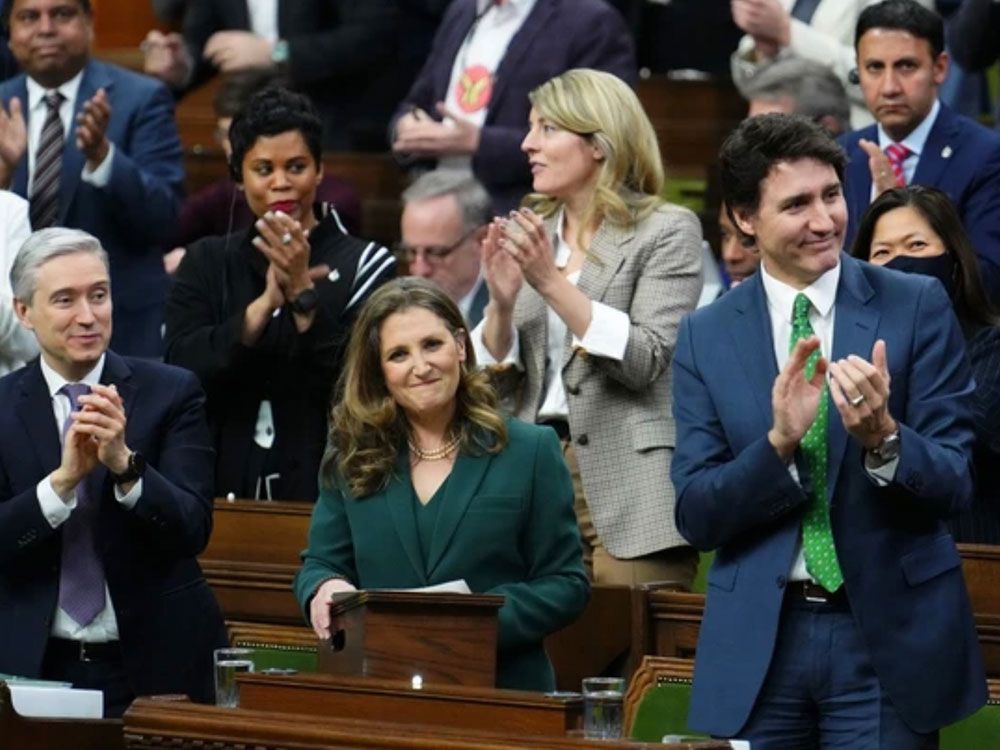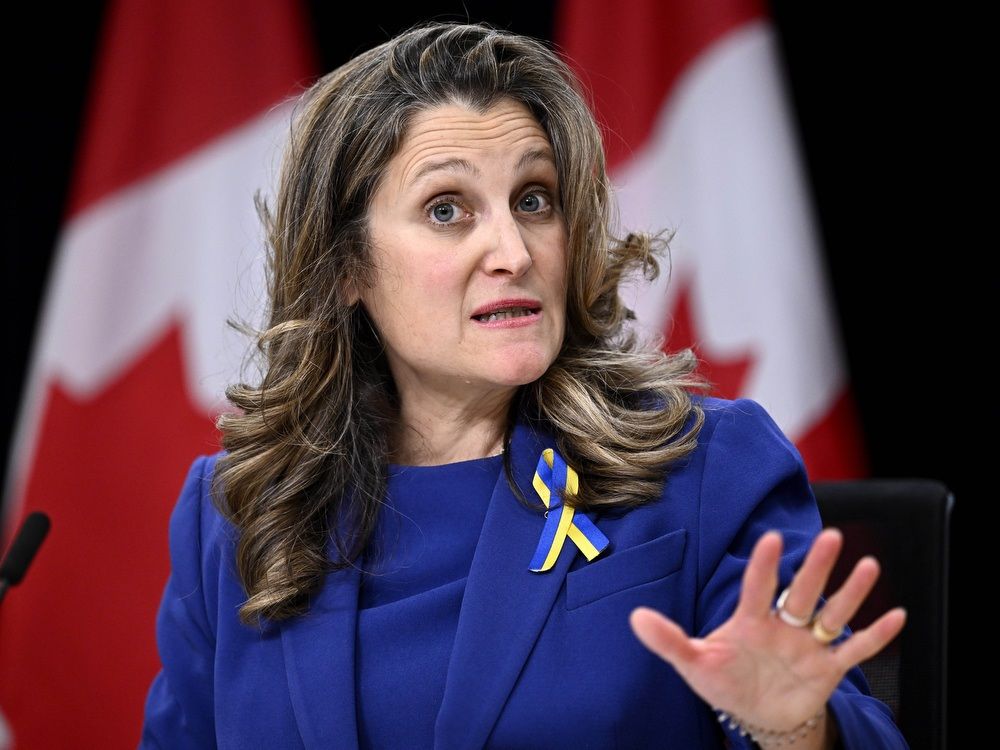Unveiling The Financial Landscape: Chrystia Freeland's Annual Salary
In the realm of Canadian politics, Chrystia Freeland has emerged as a prominent figure, known for her influential role as the Deputy Prime Minister and Minister of Finance. Her decisions and policies have far-reaching implications for the Canadian economy, attracting both support and scrutiny. As a public servant, one of the most frequently discussed topics surrounding Freeland is her annual salary, which raises questions about compensation in government roles, especially for those in high-stakes positions. As discussions about public sector pay continue to evolve, understanding Freeland's financial compensation can provide insights into the broader context of political salaries in Canada.
Chrystia Freeland’s annual salary is not just a figure; it represents the complex interplay between public service, economic policy, and the expectations of the Canadian populace. With the ongoing debates about income equality and transparency in government finances, examining Freeland's salary can help illuminate these pressing issues. It also opens the door to discussions about the value placed on political leadership in times of economic uncertainty and global change.
Furthermore, as Freeland navigates through various challenges, including trade negotiations and fiscal policies, her salary becomes a topic of interest for both supporters and critics. Understanding how her compensation aligns with her responsibilities can offer a clearer picture of the expectations placed on someone in her position. This article seeks to delve deeper into the topic of Chrystia Freeland's annual salary, exploring its implications and the broader context behind it.
- Discovering The Enigmatic Cristina Carmella
- Unraveling The Mystery Is Molly Noblitt Still Alive In 2024
What is Chrystia Freeland's Biography?
Born on August 2, 1968, in Peace River, Alberta, Chrystia Freeland has built a distinguished career in journalism and politics. She holds a degree in History from Harvard University and has worked as a journalist for notable publications such as the Financial Times and The Globe and Mail. Freeland entered the political arena in 2013 when she was elected as the Member of Parliament for Toronto Centre. She quickly rose through the ranks, becoming the Minister of Foreign Affairs in 2017 and later appointed as Deputy Prime Minister and Minister of Finance in 2020.
Personal Details and Bio Data
| Attribute | Details |
|---|---|
| Name | Chrystia Freeland |
| Date of Birth | August 2, 1968 |
| Place of Birth | Peace River, Alberta, Canada |
| Education | Harvard University (BA in History) |
| Profession | Journalist, Politician |
| Political Party | Liberal Party of Canada |
| Current Position | Deputy Prime Minister, Minister of Finance |
How Much is Chrystia Freeland's Annual Salary?
As of 2023, Chrystia Freeland’s annual salary is reported to be approximately CAD 270,000. This figure is consistent with the compensation for high-ranking officials in the Canadian government, reflecting the responsibilities and expectations associated with her roles. Freeland’s salary not only compensates her for her leadership but also takes into account the complexities of managing Canada’s economic policies during challenging times.
How Does Chrystia Freeland's Salary Compare to Other Ministers?
In the realm of Canadian politics, salaries for ministers can vary significantly based on their roles and responsibilities. For instance, while Freeland's salary is one of the higher figures due to her dual roles, it is important to note that other ministers also receive substantial compensation. Here’s a quick comparison:
- Noblitt Bully Unraveling The Mystery Of A Controversial Figure
- Emotional Farewells The Aubreigh Wyatt Goodbye Letters
- Prime Minister: Approximately CAD 365,000
- Minister of Foreign Affairs: Approximately CAD 250,000
- Minister of Health: Approximately CAD 220,000
This comparison highlights the competitive nature of salaries within the Canadian government and emphasizes the premium placed on leadership roles that are critical for national governance.
What Factors Influence Chrystia Freeland's Salary?
Several factors contribute to determining Chrystia Freeland's annual salary, including:
- Experience: Freeland’s extensive background in journalism and politics significantly enhances her qualifications for her current roles.
- Responsibilities: As the Deputy Prime Minister and Minister of Finance, she manages crucial economic policies and is involved in high-stakes negotiations.
- Public Expectations: Given the current economic climate, there are heightened expectations for leadership, which can influence salary discussions.
Is Chrystia Freeland's Salary Transparent?
Transparency in government salaries has been a growing concern among the Canadian populace. The government has made efforts to improve transparency, and Freeland's salary is publicly available through government disclosures. These measures ensure that taxpayers can see how public funds are allocated, fostering accountability in leadership roles.
What Does Chrystia Freeland's Salary Mean for Public Perception?
The discussion surrounding Chrystia Freeland's annual salary also extends to public perception. While some view her compensation as justified given her responsibilities, others argue that it should reflect the economic realities faced by everyday Canadians. This dichotomy can influence voters' opinions and impact Freeland's political capital as she navigates her roles in government.
How Does Chrystia Freeland's Salary Impact Her Political Career?
Chrystia Freeland’s annual salary plays a role in shaping her political career, as it can affect her credibility and relatability among constituents. A higher salary may lead some to question her connection to the average Canadian's experiences, particularly in times of economic hardship. However, her policies and actions in office can offset such perceptions, showcasing her commitment to addressing the challenges faced by Canadians.
Conclusion: The Broader Context of Chrystia Freeland's Annual Salary
In conclusion, Chrystia Freeland's annual salary is a reflection of her critical roles in the Canadian government and the complex landscape of political compensation. As the Deputy Prime Minister and Minister of Finance, her salary is not just a figure; it embodies the expectations placed on her leadership and the broader discussions about public service in Canada. By examining her salary, we gain insights into the value placed on political roles and the importance of transparency and accountability in governance.
Article Recommendations



Detail Author:
- Name : Mr. Emmett Gislason V
- Username : theodore65
- Email : adrien.will@hotmail.com
- Birthdate : 1995-10-30
- Address : 5566 Jordane Village Apt. 498 North Ashlychester, WY 68071-2425
- Phone : 1-575-628-5988
- Company : Stoltenberg, King and Stracke
- Job : Geological Sample Test Technician
- Bio : Porro quaerat qui praesentium. Animi at quod deleniti totam qui officia mollitia. Explicabo explicabo adipisci impedit voluptatem laboriosam sunt. Beatae explicabo sint odit non et.
Socials
instagram:
- url : https://instagram.com/nikita_official
- username : nikita_official
- bio : Illo numquam dolorum fugiat enim fugit. Et quia harum excepturi cumque explicabo dolorum.
- followers : 1933
- following : 1564
tiktok:
- url : https://tiktok.com/@eichmannn
- username : eichmannn
- bio : Dolorum dolore aut voluptatibus quia.
- followers : 2913
- following : 832
facebook:
- url : https://facebook.com/eichmann2025
- username : eichmann2025
- bio : Deserunt laudantium qui fugit nihil est facere.
- followers : 389
- following : 907
linkedin:
- url : https://linkedin.com/in/nikita1692
- username : nikita1692
- bio : Consectetur consectetur sed non saepe.
- followers : 1300
- following : 2011